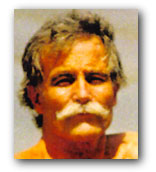

Badpuppy Gay Today |
Monday, 24 March, 1997 |

A recent conversation I enjoyed with a straight-identified hero, Dr. Sherwin B. Nuland, author of HOW WE DIE (Vintage Books, $13) helped open my eyes. Dr. Nuland's National Award Winning Book is hailed from coast to coast as clear, eloquent, moving, cultivated, unsparing and unsentimental, yet emotional and philosophical. In these dark days of AIDS and violence, this wise surgeon, with over 32 years experience, steps forward to strip away fantasy and wishful thinking by describing what happens-- step by step-- as we fearful mortals face our final moments. I'd read How We Die on the weekend, and was mesmerized. It is passionate and poetic. Nuland relies, he admits, on great poets and philosophers who've pointed his way toward clearer crystal thoughts about life and death. His motive for writing How We Die, Nuland agreed, was to de-mythologize death, making it less fearful. It seems that those who most squarely face things that cause them great anxiety are likely to live longer, freed from the upset of daily frets. Nuland encourages his readers to think seriously about the actual state of their bodies. Many years ago a well-loved gay pioneer said that while he didn't want to seem like an extremist, that almost every difficulty we face can be traced to our lack of awareness of our breathing. Think about it: when we're having sex, if our breathing is out of sync, so are we. If we're swimming, breath-awareness is essential. If we're applying for a job, hurrying along the street, our breathing had better match our stepping speed or our thoughts will be jumbled too. Dr. Nuland explains how a good supply of oxygen is the major determinant of health. When we die, oxygen is the first thing that goes. I chatted with him about likenesses between Alzheimer's and AIDS dementia. The mental difficulties caused by AIDS, he said, are usually shorter in duration. When I asked him to list other sources of damage caused our bodies besides his mentions of red meat, cigarettes, big slabs of bacon, and butter, he began by speaking of sexual risks, and about the unfortunate state of the art of condom-making, followed, of course, by drugs, as well as driving without seatbelts and the like. This famous physician became my kind of guy when I asked what kind of reply he'd make to fundamentalist preachers who say that AIDS is God's vengeance on gays or on sinner Americans. "I'd reply with physical violence," he said. Right on, doc. I'd noted with satisfaction that Nuland used the only truly riveting curse words in his book to describe AIDS when he quoted a Dr. Defoe calling it "this fucking goddamn disease," and that he himself had repeated her words. He didn't back down on that one. In fact, he marched forward into a passionate gut-level description of AIDS as the greatest plague to ever hit humanity. He said that one reviewer had knocked him for this, bringing up the Black Plague several centuries ago. But that wasn't the killer that AIDS has become, he answered. We talked about the pharmaceutical companies that gouge patients with high-costing drugs, and I asked him if there wasn't some way his profession might police this kind of undue profiteering, the kind that has allowed twelve thousand annual price-tags. He told me I'd asked a tough one, admitting that while he sympathized with my suggestion, he didn't see how it could take place, given the current footsies played between doctors and pharmaceutical companies. The drug salesmen call on the doctors when they're busy, he noted, and sales are made without enough consideration for patient costs. We all know, he said, that pharmaceutical stock is just about one of the best investments, and he knows of one chairman of a major drug company whose salary is unbelievably astronomical. The prospects of reform seems daunting, but he praises, nevertheless, the activism of AIDS patient pressure groups, saying that they'd been--including the earliest ones managed by gay activists--effective in creating a troika of government, universities, and pharmaceutical companies. Though he questioned over-reactions among some activist groups, he recognized the need for rocking the boat Sixties style. He felt, he said, that even though the incidence of tuberculosis is 500 times higher among AIDS patients than in the general population, that such a fact posed little or no present threat to the general community. I asked what he thought of "plot" theories about the lab-creation of AIDS, and he said he felt them misguided. One myth about death that has been almost universally accepted--not only by laymen but by physicians too--has been that surrounding the growth of hair and nails once a corpse has been laid to rest. "It doesn't happen," laughed the good doctor, "I used to think it did, but then I found out I was wrong." In the publishing industry we often create "How To" books and articles, because often in book titles the words "How To" seem to appeal to readers. Dr. Nuland's title, How We Die, is something else, however. "How To" is different for each of us. Each death, he writes, is highly individualistic, as unique as the person it claims. But if the subject of death seems too morbid, too anxiety-provoking, then reflect on a quote Nuland summons from Montaigne, that "To Study Philosophy is to Learn to Die." Dr. Nuland knows that this is of the essence of what one can say about how to die. It speaks directly about how we live, posing those basic questions which, in the experience of every wise person, makes dying much easier. I promised the fine author I'd spread the good word about his book. Read it to understand and diffuse your worst fears.
|